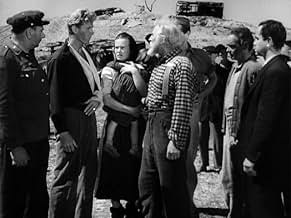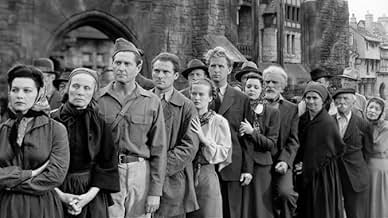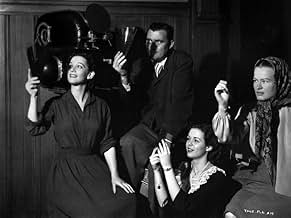Ajouter une intrigue dans votre langueIn the dying days of World War II a German agent infiltrates a recently liberated Belgian town. His aim is to turn them against their Allied liberators.In the dying days of World War II a German agent infiltrates a recently liberated Belgian town. His aim is to turn them against their Allied liberators.In the dying days of World War II a German agent infiltrates a recently liberated Belgian town. His aim is to turn them against their Allied liberators.
- Réalisation
- Scénario
- Casting principal
- Récompenses
- 1 victoire au total
Helen Beverley
- Mrs. Martha Varin
- (as Helen Beverly)
Richard Aherne
- Sergeant Patrick O'Farrell
- (as Richard Nugent)
Ludwig Donath
- Schmidt
- (as Louis Donath)
Gigi Perreau
- Baby
- (as Ghislaine Perreau)
Axel Anderson
- Nazi Officer
- (non crédité)
George Blagoi
- Nazi Officer
- (non crédité)
Sammy Blum
- Alex
- (non crédité)
Avis à la une
Set in the near future following Germany's surrender - which probably qualifies it as science fiction - 'The Master Race' was made when being anti-Nazi wasn't yet deemed to be unAmerican and it was still believed that former Nazis were just waiting their chance to stage a comeback.
Representing a key credit for director Herbert J. Biberman, later to be blacklisted as one of the Hollywood Ten - Philip Dorn's portrayal of a noble Russian probably didn't help - and hailing from the days when George Coulouris was playing Nazis in Hollywood, 'The Master Race' contains an early expression of the belief that later became a Marxist commonplace that social forces not individuals decided political outcomes and that Hitler was just the puppet of vested financial interests; made overt by the opening scene when Coulouris glances at a portrait of his erstwhile Fuhrer and says "In defeat he has no value. They can have him...!"
Representing a key credit for director Herbert J. Biberman, later to be blacklisted as one of the Hollywood Ten - Philip Dorn's portrayal of a noble Russian probably didn't help - and hailing from the days when George Coulouris was playing Nazis in Hollywood, 'The Master Race' contains an early expression of the belief that later became a Marxist commonplace that social forces not individuals decided political outcomes and that Hitler was just the puppet of vested financial interests; made overt by the opening scene when Coulouris glances at a portrait of his erstwhile Fuhrer and says "In defeat he has no value. They can have him...!"
Herbert Biberman (1900-1971) is the writer and director of this 1944 film. Biberman was a member of the left wing theatre group in New York City and was married to Gale Sondergaard. Both Biberman and Sondergaard were victims of the HUAC "red scare" – Biberman served time in prison and both were blacklisted.
This was his third film as director, fifth as a writer.
Lloyd Bridges (1913-1998) has a minor role in the film. Bridges too was briefly blacklisted but turned around and would be a staunch right wing presence.
(Doc) Robert Golden produced the film. He also produced "Hitler's Children" (1943) which was directed by Edward Dmytryk, another director imprisoned during the HUAC trials. "Hitler's Children" was the most successful film for RKO, even surpassing King Kong, and led to this film being made.
From the film there aren't many obvious communist themes, but there is a sympathetic Russian soldier and there is a lot of emphasis on people working together. The film is ardently anti-Nazi.
George Coulouris (1903-1989) gives the best performance of his career. Osa Massen (1914-2006) is excellent.
This was his third film as director, fifth as a writer.
Lloyd Bridges (1913-1998) has a minor role in the film. Bridges too was briefly blacklisted but turned around and would be a staunch right wing presence.
(Doc) Robert Golden produced the film. He also produced "Hitler's Children" (1943) which was directed by Edward Dmytryk, another director imprisoned during the HUAC trials. "Hitler's Children" was the most successful film for RKO, even surpassing King Kong, and led to this film being made.
From the film there aren't many obvious communist themes, but there is a sympathetic Russian soldier and there is a lot of emphasis on people working together. The film is ardently anti-Nazi.
George Coulouris (1903-1989) gives the best performance of his career. Osa Massen (1914-2006) is excellent.
Interesting and original central plot, more than negated by over-the-top propaganda and preachiness.
1944 and the Allies are pushing the Germans back on all fronts. In a last-ditch attempt to prolong the Third Reich and impose their will upon the world, the Nazis come up with a diabolical plan. Agents are sent to soon-to-be-liberated towns with the intention of blending in with the local population and turning them against the Allied liberators. One such agent is Colonel Frederick Von Beck. His aim is to sow seeds of distrust and revolution among the inhabitants of a small Belgian town.
Very original central plot, giving the movie heaps of potential. However, unfortunately, the year of release gives away how things develop from there. Being made during WW2 meant this was going to be a propaganda film. This doesn't have to be the death knell for a film - it is possible to make a propaganda film that remains watchable decades after the war has ended.
Unfortunately, this is not an example of such a movie. Incredibly one-dimensional and heavy-handed in its propaganda, there is no subtlety here. The Germans are evil to the nth degree. Even the Russians are portrayed as angels - anything for the war effort. Quite over-the-top in the extremeness of the propaganda.
This isn't the worst of it. A stark black-and-white good vs evil film could still have been entertaining. However, there's really not much action. Instead, we have speeches upon speeches, none of which say anything new or edifying - it's all stuff we already know: the Nazis are bad, fascism is bad, people need to be free, etc. Yet, every chance is grabbed to jam in a speech. What should have been one line in a dialogue turns into a several-minute monologue.
It's all so tedious and preachy.
Very original central plot, giving the movie heaps of potential. However, unfortunately, the year of release gives away how things develop from there. Being made during WW2 meant this was going to be a propaganda film. This doesn't have to be the death knell for a film - it is possible to make a propaganda film that remains watchable decades after the war has ended.
Unfortunately, this is not an example of such a movie. Incredibly one-dimensional and heavy-handed in its propaganda, there is no subtlety here. The Germans are evil to the nth degree. Even the Russians are portrayed as angels - anything for the war effort. Quite over-the-top in the extremeness of the propaganda.
This isn't the worst of it. A stark black-and-white good vs evil film could still have been entertaining. However, there's really not much action. Instead, we have speeches upon speeches, none of which say anything new or edifying - it's all stuff we already know: the Nazis are bad, fascism is bad, people need to be free, etc. Yet, every chance is grabbed to jam in a speech. What should have been one line in a dialogue turns into a several-minute monologue.
It's all so tedious and preachy.
The story is about a group of Nazis who try to blend in the with locals in the waning days of the war. One in particular, Colonel Von Beck (George Coulouris) is the star of the film...and his methods seem bent on sowing discontent and chaos. Can the Allies figure out who this man is before it's too late?
According to IMDB, this film was rushed through production in order to capitalize on the recent Allied invasion of France. And, while I watched, the film did have a hurried feel to it. It wasn't due to the acting or music or cinematography but the story itself...a story that seemed like it needed a re-write as some of it was a bit rough. Some examples of how heavy-handed and shallow some of the scenes were would be the incredibly over-idealized Russian doctor as well as the church scene. In addition the film uses one of the worst cliches in film history...a person telling the evil person that they are going to turn them in to the authorities! You just KNOW what's gonna happen to this woman!
By the way, despite me not enjoying the story, George Coulouris was wonderful as the Nazi agent...and he was always excellent in playing awful characters.
According to IMDB, this film was rushed through production in order to capitalize on the recent Allied invasion of France. And, while I watched, the film did have a hurried feel to it. It wasn't due to the acting or music or cinematography but the story itself...a story that seemed like it needed a re-write as some of it was a bit rough. Some examples of how heavy-handed and shallow some of the scenes were would be the incredibly over-idealized Russian doctor as well as the church scene. In addition the film uses one of the worst cliches in film history...a person telling the evil person that they are going to turn them in to the authorities! You just KNOW what's gonna happen to this woman!
By the way, despite me not enjoying the story, George Coulouris was wonderful as the Nazi agent...and he was always excellent in playing awful characters.
Based on the title and the first few minutes, this looks like it will be a kind of "Boys from Brazil" story about Neo-Nazis out to reclaim the world, but it's actually a rather run-of-the-mill WWII propaganda melodrama of betrayal and loyalty. George Coulouris plays von Beck, a Nazi general who leads a group of "inner circle" Nazis on the eve of Germany's surrender (the movie was released after D-Day but before the actual surrender). Glad to leave the weakened Hitler behind, the group goes underground, intending to get new identities and foment dissent among the liberated peoples of the former Third Reich. In Belgium, Coulouris pretends to be his brother, moves in with his sister-in-law and her daughter (who were seen as collaborators by the villagers), and tries to derail the Allies to return the land to nomality. Paul Guilfoyle (father to the Paul Guilfoyle who currently plays Brass on CSI) is Coulouris' first conquest in his propaganda battle. Lloyd Bridges is a former concentration camp prisoner and Nancy Gates is his girlfriend. The most interesting character is Helena, played by Osa Massen, who was raped by a German soldier and subsequently bore a child (Gigi Perreau in a wordless performance). The two have become semi-outcasts, seen as tainted by Nazi blood. There is some nice use of light and shadow in some scenes but aside from its interesting set-up, nothing very exciting goes on. After the opening, we never see any of the other "inner circle" Nazis and the whole film becomes a story of the villagers struggling to trust each other again. One of the worst lines of dialogue in any WWII movie occurs here when Bridges has to say, at an inspiring moment, "When the Lord made people, he had a great idea!" Massen is the best actor in the picture, even though she is saddled with having to look wide-eyed and sinister for the first half of the film until her secret shame (which we guess early on) finally comes out.
Le saviez-vous
- Anecdotes"Lux Radio Theater" broadcast a 60 minute radio adaptation of the movie on Januray 15, 1945 with George Coulouris and Helen Beverley reprising their film roles.
- GaffesThe British officer Captain William Forsythe gives a palm down American style salute.
- Citations
Senior Lt. Andrei Krestov: I'm a doctor. or I was. and I can play the mouth fork.
Major Phil Carson: I was afraid of that.
- ConnexionsFeatured in Hollywood the Golden Years: The RKO Story: Dark Victory (1987)
Meilleurs choix
Connectez-vous pour évaluer et suivre la liste de favoris afin de recevoir des recommandations personnalisées
Détails
- Date de sortie
- Pays d’origine
- Langue
- Aussi connu sous le nom de
- La raça suprema
- Lieux de tournage
- Société de production
- Voir plus de crédits d'entreprise sur IMDbPro
- Durée
- 1 heure et 35 minutes
- Couleur
- Rapport de forme
- 1.37 : 1
Contribuer à cette page
Suggérer une modification ou ajouter du contenu manquant

































